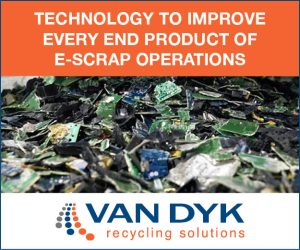
Pinellas County, Fla. officials said residents have disposed of more e-scrap through their regular garbage than the household hazardous waste program. | Mameraman/Shutterstock
Two municipalities in Florida have sidestepped sending household e-scrap to their contracted processor for recycling and are instead hauling material to a waste-to-energy plant.
Pinellas County, which includes St. Petersburg, Clearwater and other cities, stopped sending the public’s e-scrap to a contracted recycler as of October 2022, instead shipping the material it collects to a waste-to-energy plant owned by the county and operated by Covanta. More recently, the city of Clearwater discontinued its e-scrap collection days as of May 1.
Pinellas County and Clearwater said residents can place TVs, monitors, CPUs, laptops, tablets, cell phones and other electronics in their trash bins, although they emphasized that rechargeable batteries must be removed because of fire risks.
“Ultimately, we felt it was best for us to manage the e-waste in house via our Waste-to-Energy facility than send it to a third-party company,” said Emily LeMay, program coordinator for recycling and outreach programs at Pinellas County.
Why the change?
County officials pointed to multiple reasons for the change in downstream e-scrap management, none of which included dissatisfaction with the current e-scrap recycling contract holder.
“We felt it was best to manage e-waste in house because we can, via our Waste-to-Energy Facility, recover the metals and can burn the hard plastic casing to create energy,” according to a county statement provided by LeMay. “There are limited markets for the hard plastic casing, so it is more likely to be landfilled if it leaves Pinellas County.”
During a public information session a year ago, the director of the county’s solid waste department, Paul Sacco, said the county was finding limited markets to recycle household electronics. Additionally, the county has learned that in-house management of materials is best, he said.
County officials also noted that residents were throwing more electronics in their garbage cans than they were dropping off at the county’s household hazardous waste (HHW) center or collection events for recycling anyway.
“Prior to this change, approximately 6,800 tons of electronic waste had already been disposed of as regular garbage and was being processed at the Solid Waste Disposal Complex each year compared to a mere 460 tons of electronic waste collected through the HHW Center’s programs annually,” LeMay said.
The new status quo
The county continues to have a contract with Lake Mary, Fla.-based e-scrap processor A1 Assets, even though material isn’t flowing there anymore. First approved in late 2018, that five-year contract expires Oct. 22, 2023.
“We want to be clear that this decision has nothing to do with A1 Assets,” the statement noted. “A1 Assets continues to provide service to our Business Electronics & Chemical Collection events and will continue to do so as a subcontractor to Republic Services/US Ecology once their direct contract with us expires in October 2023.”
County officials insisted the waste-to-energy plant can recover metals from electronics. When asked by E-Scrap News how copper and precious metals in printed circuit boards could be effectively recovered by a municipal solid waste incinerator, county officials said the plant uses magnets and an eddy current separator to recover ferrous and non-ferrous metals from the ash.
“Both technologies are necessary and complementary to recover the metals for cleaning and scrap sales,” according to the statement.



